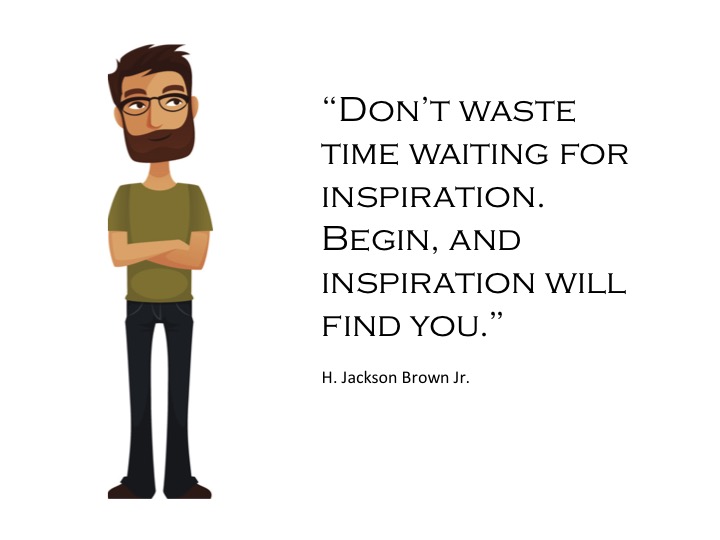Well that’s all very well. But if you are anything like me, the actual beginning part is actually really hard. Even when I sat down to write this blog . . . hmmmm maybe I will make myself a coffee before I start . . . now I’m making my coffee I should quickly clean the kitchen bench down . . .just noticed I’m almost out of cleaning spray so better add it to the shopping list, that wont take long . . .
And that’s indicative of a lot of things I do. Sure, all those things that distracted me are worthy of some sort of action. But they are all pebbles that should fit around the big rocks in my life – not the other way round. So I decided to research the subject of writer’s block. Is this common and what are the ways that people have found to overcome this phenomenon?
Wikipedia defines writers block as a condition, primarily associated with writing, in which an author loses the ability to produce new work or experiences a creative slowdown. The condition ranges in difficulty from coming up with original ideas to being unable to produce a work for years.
As far as I could find out, writers block isn’t a medical diagnosis in itself. But some may exhibit writers’ block type symptoms as part of mental illness - such as anxiety of depression for instance. And yes its common. Wikipedia lists authors F. Scott Fitzgerald and Joseph Mitchell, pop culture cartoonist Charles M. Schulz and British songwriter Adele as just some who have ben known to suffer from this affliction.
1. Get an hourglass
I read that Dan Brown keeps an hourglass on his desk - every hour he takes mini-breaks to do some exercise. Others make a plan at the beginning of the day with times for writing and times for doing other stuff. One tip that apparently works . . . don’t make writing the first thing on your plan; instead do the thing that is nagging most in your brain first (like paying a bill that’s overdue).
2. Write gobbledegook
The Artists Way is a book, and course, all about bring creativity back into the lives of artists (or anyone for that matter). One of the core exercises for three months is to write 3 pages every morning. And as soon as you put pen to paper you must write. Write about anything. Write that “I don’t know what to write” seven times. Its amazing how the power of just writing, about anything, lubricates your inspiration and creativity . . .
3. Dress for the occasion
Roald Dahl climbed into his sleeping bag to begin writing. It was the “uniform” he associated with his craft. Into the sleeping bag – its writing time . . .
Another approach, try dressing up. Like it’s a job where you are meeting and working with people. Would you go to a job like that in your sweat pants and hoodie? Put on some decent clothes, brush your hair, check yourself out in the mirror. Writing is something you are serious about, so dress up for the start of your writing time.
4. Cut the internet connections
Disable your internet connection. Its just too distracting and way too tempting. That funny cats youtube video . . . really ?
And another thing about electronics. Electromagnetic fields (EMFs) have been found to disrupt the natural energy flows in your body – affecting the nervous system and increasing stress. Insomnia, anxiety and depression have all ben linked to exposure to EMFs. Feng Shui thinking says leave electronics out of the bedroom. Now that isn't always easy with writing in this electronic age – just something to be aware of . . .
5. Quit
No not quit permanently. Quit the situation or the place for a while. Find a new and energising place to be creative. Go for a walk to clear the brain. Meditate or practice some yoga. The idea is to come back refreshed and renewed.


 RSS Feed
RSS Feed